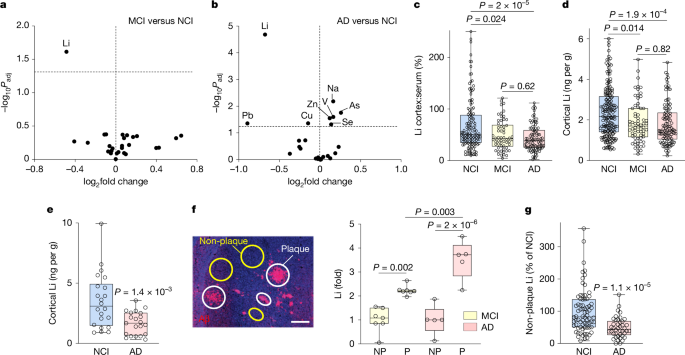Lithium And Alzheimer's Disease: Investigating The Potential For Prevention And Treatment.

Welcome to your ultimate source for breaking news, trending updates, and in-depth stories from around the world. Whether it's politics, technology, entertainment, sports, or lifestyle, we bring you real-time updates that keep you informed and ahead of the curve.
Our team works tirelessly to ensure you never miss a moment. From the latest developments in global events to the most talked-about topics on social media, our news platform is designed to deliver accurate and timely information, all in one place.
Stay in the know and join thousands of readers who trust us for reliable, up-to-date content. Explore our expertly curated articles and dive deeper into the stories that matter to you. Visit Best Website now and be part of the conversation. Don't miss out on the headlines that shape our world!
Table of Contents
Lithium and Alzheimer's Disease: Investigating the Potential for Prevention and Treatment
Alzheimer's disease, a devastating neurodegenerative disorder affecting millions worldwide, currently lacks a cure. While treatments exist to manage symptoms, the search for preventative measures and effective therapies remains a top priority for researchers. Recent studies have shed light on a surprising potential ally in this fight: lithium. This article delves into the burgeoning research exploring lithium's role in Alzheimer's prevention and treatment, examining the potential mechanisms and the ongoing clinical trials shaping the future of this promising area.
The Intriguing Link Between Lithium and Brain Health
Lithium, a naturally occurring element, is primarily known for its use in treating bipolar disorder. However, its therapeutic effects extend beyond mood stabilization. Emerging evidence suggests lithium possesses neuroprotective properties, potentially mitigating the damage associated with Alzheimer's disease. This neuroprotective effect is believed to stem from several mechanisms:
- Reduced Tau Protein Aggregation: One of the hallmarks of Alzheimer's is the abnormal accumulation of tau protein, forming neurofibrillary tangles that disrupt brain function. Studies suggest lithium can inhibit tau aggregation, potentially slowing disease progression.
- Improved Synaptic Plasticity: Lithium may enhance synaptic plasticity, the brain's ability to adapt and form new connections, a process crucial for learning and memory, severely impaired in Alzheimer's.
- Anti-Inflammatory Effects: Neuroinflammation plays a significant role in Alzheimer's pathogenesis. Lithium's anti-inflammatory properties could help reduce this inflammation, protecting brain cells from damage.
- Neurotrophic Factor Stimulation: Lithium may stimulate the production of neurotrophic factors, proteins that support the growth and survival of neurons, potentially promoting neuronal repair and regeneration.
Lithium's Potential: Prevention and Treatment
The potential benefits of lithium extend to both the prevention and treatment of Alzheimer's. While more research is needed, preliminary findings are encouraging:
- Prevention: Some studies suggest that long-term, low-dose lithium exposure might reduce the risk of developing Alzheimer's disease. This is based on observational studies showing lower rates of dementia in individuals living in areas with higher lithium levels in drinking water. However, it's crucial to remember correlation doesn't equal causation, and further investigation is necessary.
- Treatment: Clinical trials are underway to evaluate lithium's efficacy as an Alzheimer's treatment. These trials are exploring the effects of lithium on cognitive function, amyloid-beta plaques (another hallmark of Alzheimer's), and overall disease progression. The results of these trials will be instrumental in determining lithium's therapeutic potential.
Challenges and Future Directions
Despite the promising research, several challenges remain:
- Optimal Dosage: Determining the optimal dosage of lithium for Alzheimer's prevention and treatment is crucial. High doses can lead to adverse effects, highlighting the need for careful monitoring.
- Long-Term Effects: Long-term studies are needed to assess the long-term safety and efficacy of lithium in Alzheimer's patients.
- Individual Variability: Response to lithium can vary significantly between individuals, necessitating personalized treatment approaches.
Conclusion: A Promising Avenue of Research
The research exploring lithium's potential in Alzheimer's disease is still in its early stages, but the results are compelling. While more research is needed to confirm its efficacy and safety, lithium represents a promising avenue for both preventing and treating this devastating disease. Future studies, particularly large-scale clinical trials, will be critical in determining its true impact on the lives of those affected by Alzheimer's. Stay informed about the latest research developments and consult with your healthcare provider for any concerns regarding Alzheimer's disease or potential preventative measures. For further information on Alzheimer's research, visit the .

Thank you for visiting our website, your trusted source for the latest updates and in-depth coverage on Lithium And Alzheimer's Disease: Investigating The Potential For Prevention And Treatment.. We're committed to keeping you informed with timely and accurate information to meet your curiosity and needs.
If you have any questions, suggestions, or feedback, we'd love to hear from you. Your insights are valuable to us and help us improve to serve you better. Feel free to reach out through our contact page.
Don't forget to bookmark our website and check back regularly for the latest headlines and trending topics. See you next time, and thank you for being part of our growing community!
Featured Posts
-
 Ecuador Gang War Cnns Exclusive Interview With A Top Commander
Aug 09, 2025
Ecuador Gang War Cnns Exclusive Interview With A Top Commander
Aug 09, 2025 -
 Ukraine War Trump Putin Dialogue Unlikely To Bring Immediate Resolution
Aug 09, 2025
Ukraine War Trump Putin Dialogue Unlikely To Bring Immediate Resolution
Aug 09, 2025 -
 Combien Remportent Les Joueuses A L Open De Cincinnati
Aug 09, 2025
Combien Remportent Les Joueuses A L Open De Cincinnati
Aug 09, 2025 -
 Chat Gpts Gpt 5 Rollout A User Backlash Against Model Replacements
Aug 09, 2025
Chat Gpts Gpt 5 Rollout A User Backlash Against Model Replacements
Aug 09, 2025 -
 Golfer Tommy Fleetwoods Net Worth And Marital Challenges
Aug 09, 2025
Golfer Tommy Fleetwoods Net Worth And Marital Challenges
Aug 09, 2025
Latest Posts
-
 Nicola Sturgeons Memoir Raw Account Of Arrest And Its Aftermath
Aug 10, 2025
Nicola Sturgeons Memoir Raw Account Of Arrest And Its Aftermath
Aug 10, 2025 -
 Bhim Kohli Police Inaction Before Deadly Dog Attack Sparks Outrage
Aug 10, 2025
Bhim Kohli Police Inaction Before Deadly Dog Attack Sparks Outrage
Aug 10, 2025 -
 Smithsonian Museum Alters Trump Impeachment Display A Closer Look
Aug 10, 2025
Smithsonian Museum Alters Trump Impeachment Display A Closer Look
Aug 10, 2025 -
 Sturgeons Memoir Arrest Detailed As Worst Day Of My Life
Aug 10, 2025
Sturgeons Memoir Arrest Detailed As Worst Day Of My Life
Aug 10, 2025 -
 Teenager Amputee Blames Driver For Life Altering Crash
Aug 10, 2025
Teenager Amputee Blames Driver For Life Altering Crash
Aug 10, 2025
